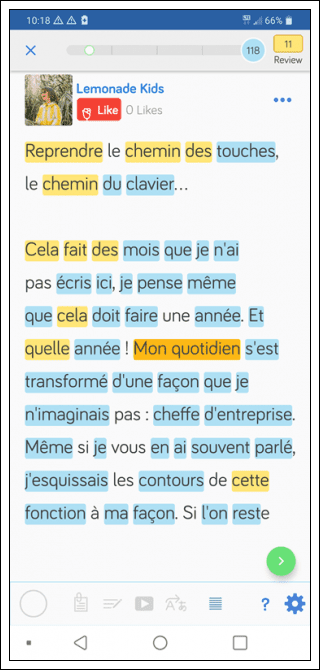How Long Does It Take to Learn French?
The big question most people who start learning French is usually, “How long does it take to learn French?”
I was lucky enough to have been born in a part of Canada which is known as a bi-lingual community. Pretty much anywhere you go around here, you’ll find people who speak both English and French, or a combination of both, known as “Frenglish”.
But even though I’ve attended French schools my whole life, I usually speak English, which means that my French skills tend to get a bit rusty every now and then.
That’s why I find it extremely important study from time to time to sharpen my skills and keep my French speaking abilities alive.
But if you are looking to learn French on your own, you might be left wondering how long it actually takes to learn the language.
That’s why we’ve put together this handy guide, which will explain the different learning stages, and we’ll also leave you with a few study tips to help you learn French as fast as possible.

Timeline and Study Schedules
Obviously, learning French isn’t something that happens over night. It usually takes years to become fluent in a new language, but of course, how long it takes has a lot to do with your own personal study habits and how much time you spend practicing every week.
Personally, I learnt French in school when I was a child. Therefore, I spent plenty of time every week learning about the language and practicing. But for those of you who are learning French on your own, it’s important to understand that you’ll have to put a bit of effort into learning the language.
I recommend that you spend at least one hour per night studying and practicing what you’ve learnt. It’s also a good idea to break up your study periods, so that you don’t get overwhelmed with all the new knowledge you’ll be learning.
I suggest spending the first part of your study session reading and listening to get used to the language. And for the second part, use this time to practice speaking what you’ve learnt and improving on your verbal capabilities. Once a week for the first month or so should be enough.
Below, I’ll go over the individual stages of becoming a French speaker.
Elementary Proficiency
This is the most basic level of proficiency and is when a person’s French speaking abilities are able to satisfy routine travel needs and courtesy requirements. This level can usually be achieved after a few weeks of study. Most of this time should be spent listening and reading, speaking can wait until you have a list of French vocabulary floating around in your head.
Limited Working Proficiency
The person is able to satisfy routine social demands and working requirements, although with limited capabilities. It takes about 2 months to reach this level. At this stage, you should try speaking once or twice a week.
Minimum Professional Proficiency
The person is able to speak with a sufficient vocabulary to participate effectively in conversations on practical, social, and professional topics. Depending on study habits and how much you practice, this level should be attainable in 6 to 12 months. By this time, you should be listening everyday and speaking with a partner several times a week.
Full Professional Proficiency
At this stage, a person can speak fluently on all levels required to satisfy both social and professional requirements. Typically, it takes 12 months to be able to speak at this level (as long as you have been putting in 5-10 hours a week).
Native or Bilingual Proficiency
The final stage is when a person has the language capabilities equivalent to that of an educated native speaker. How long does this take? Hard to say, since it depends greatly on how much effort you put in, but after a year (400 hours or so) of meaningful study, your level should be high enough to be able to converse about almost anything.
The Easiest and Hardest Parts of Learning French
For me, learning French was relatively easy because I was attending a French school and have several family members who also speak the language. That being said, learning French came naturally, since I had plenty of study time at school and I was able to practice with my friends and family.
However, that doesn’t mean that learning French is going to be easy for everyone. In fact, French can be a hard language to learn, especially when compared to English. This is because French has a much larger vocabulary and more grammar rules, which at first, can be a bit confusing for a non-French speaker. On the other-hand, French has a lot of similarities to English. One being both languages use the same alphabet, which is a huge bonus (compared to learning Japanese or Arabic, for example).
It’s important to go into learning French knowing that it will take some time to become fluent. But, above all, the most important thing is to study and practice, and stay motivated, no matter what.
Recommendations
If you’re serious about wanting to learn French, I’d recommend trying to immerse yourself in the language as much as possible. This means reading French blogs, watching French movies, listening to French radio stations or podcasts. After a month or so, try finding other people with whom you can practice your speaking skills.
Resources to Use
Just like I’ve mentioned, books, videos, and podcasts are some of the best resources for being able to help you learn French. Not only do they allow you to immerse yourself in the language, but you’ll also be able to see how the language is used naturally by fluent French speakers.
Check out these other posts for great resources:
9 French Podcasts for Learners at Every Level
Practice Your French by Reading from These French Fashion Bloggers
By reading and listening at least an hour day, you’ll start to get a feel for the language and understand how the grammar works
Speed Up Your French Using LingQ
LingQ comes with thousands of hours of content. If you’re a beginner, you’ll be able to find a lot of great courses in LingQ’s lesson library that’s perfect for you.
If you cannot find any lessons that interest you on LingQ, you can import your own content. Check out this post that will teach you how you can import YouTube videos into LingQ. You can also import blog posts, music audio, audiobooks, and much more. For example, below is a lesson I created using an article from a French fashion blog.

Using LingQ, you can save words, look them up, and listen to the audio (if it is included) on your phone or on your desktop. Give it a go and see how much faster you’ll be able to learn French.
Finally, if you are interested to hear what Polyglot Steve Kaufmann has to say on the time it takes to learn a new language, check out this post.
Good luck!
***
Joel is an ex-construction worker turned online content writer. He writes mostly about topics related to finance, health, wealth and wellness. When he’s not writing, Joel is usually out exploring new hiking trails with his dog, Baxter.



